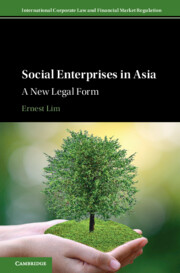Book contents
- Social Enterprises in Asia
- Reviews
- International Corporate Law and Financial Market Regulation
- Social Enterprises in Asia
- Copyright page
- Contents
- Tables
- Acknowledgements
- Table of Cases
- Table of Legislation and Regulations
- Abbreviations
- 1 Introduction and Overview
- 2 Corporate Purpose
- 3 Directors’ Duties
- 4 Decision-Making Powers
- 5 Reporting, Impact Measurement, and Certification
- 6 Distribution of Dividends, Assets, and Tax Benefits
- 7 Conclusion
- Appendix 1 List of 80 Social Enterprises
- Bibliography
- Index
4 - Decision-Making Powers
Published online by Cambridge University Press: 12 March 2023
- Social Enterprises in Asia
- Reviews
- International Corporate Law and Financial Market Regulation
- Social Enterprises in Asia
- Copyright page
- Contents
- Tables
- Acknowledgements
- Table of Cases
- Table of Legislation and Regulations
- Abbreviations
- 1 Introduction and Overview
- 2 Corporate Purpose
- 3 Directors’ Duties
- 4 Decision-Making Powers
- 5 Reporting, Impact Measurement, and Certification
- 6 Distribution of Dividends, Assets, and Tax Benefits
- 7 Conclusion
- Appendix 1 List of 80 Social Enterprises
- Bibliography
- Index
Summary
This chapter argues that beneficiaries of social enterprises should be given decision-making powers. I examine two problems with restricting the decision-making powers to shareholders, that is, shareholders can exercise the governance rights to benefit themselves but at the expense of the constituencies that the social enterprise is set up to benefit; and it is odd for a social enterprise to claim that it seeks to pursue social welfare and to promote public benefit, and yet its beneficiaries have absolutely no say in how the social enterprise is being run. I then analyze three objections in giving beneficiaries decision-making powers, that is, it will be disruptive and inefficient; beneficiaries can act opportunistically; and only shareholders have the incentive and ability to monitor. Finally, I assess five different decision-making mechanisms, that is, beneficiary advisory panel; director appointed from the beneficiary advisory panel; appointing independent nonexecutive directors; beneficiaries as shareholders; appointing a regulator and public enforcement.
Information
- Type
- Chapter
- Information
- Social Enterprises in AsiaA New Legal Form, pp. 101 - 120Publisher: Cambridge University PressPrint publication year: 2023
